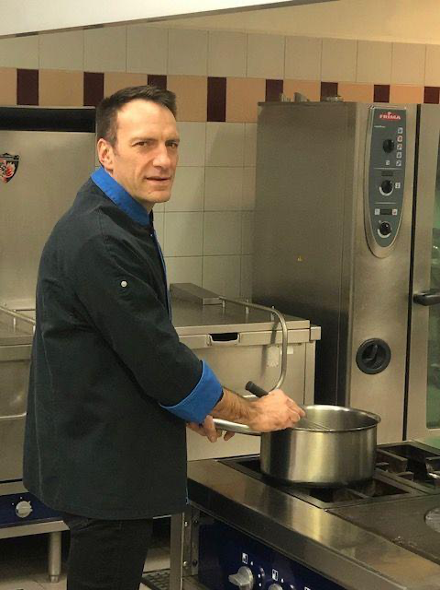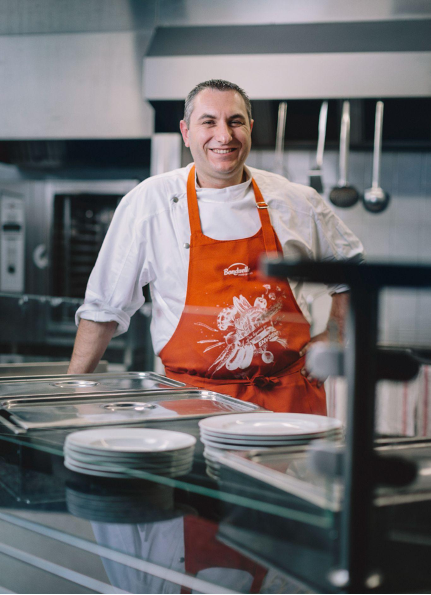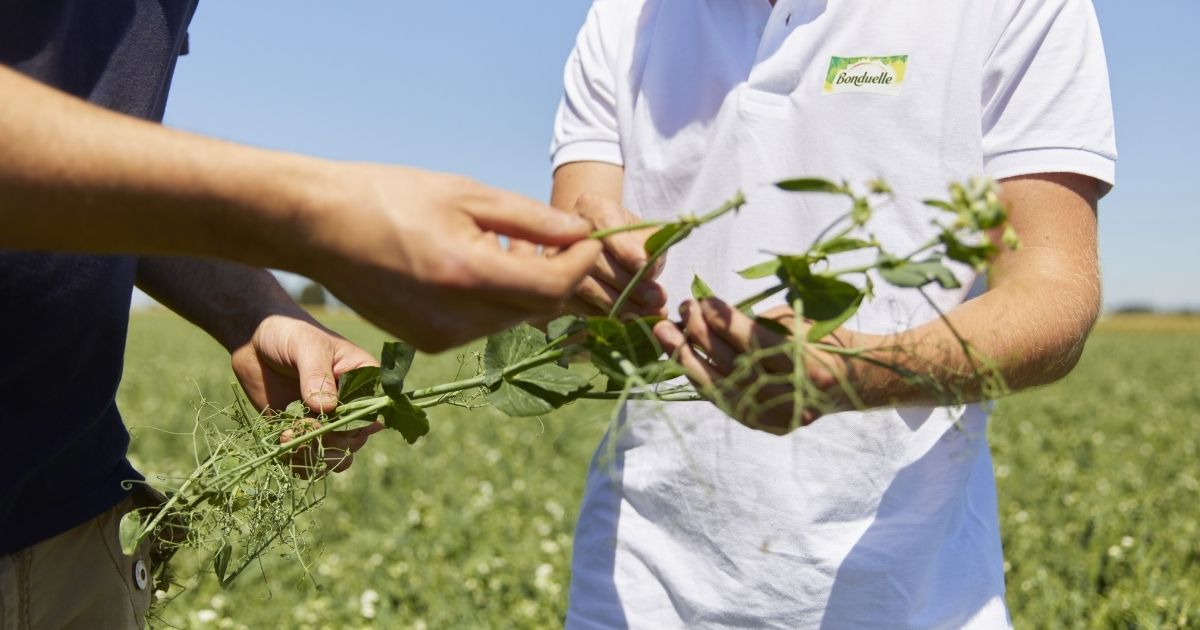Published at 2022, January 24th
Food is a central component in our lives and as such constitutes a formidable lever in the fight against social inequalities and climate change. It is in this sense that the French EGAlim law, or “law for the balance of commercial relations in the agricultural and food sector and a healthy, sustainable and accessible food for all” was designed. Promulgated in 2018, it has been in force since January 1, 2022 and provides for several measures to promote healthy, safe and sustainable food for all and intensify the fight against food waste.
At a time of new regulatory changes, Bonduelle Food Service is more than ever supporting foodservice players in the food transition. Focus on the appropriation of the EGAlim law by chefs in the foodservice industry with Pierre Bidault, Marketing and Sales Director of Bonduelle Food Service, who shares with us a cross interview with Yann Faveeuw, Catering Manager at the Ernest Couteaux High School in Saint-Amand-Les-Eaux (France), and Lionel Sédano, Culinary Advisor at Bonduelle.


What changes have you noticed in the way the French eat in recent years?
Yann Faveeuw: In 14 years of working in a high school, I can really see the evolution of demands. Especially since, when they arrive at high school, children and teenagers start to forge their dietary character, they have more power and independence, so they can decide to eat differently. I have noticed, for example, that many girls decide to stop eating animal proteins, because of the peer effect, or with their family. The question of habit does indeed play an important role. In any case, these children have already formed habits in primary school. As they get younger and younger, they have information and keys on how to eat healthier and sustainably.
Lionel Sédano: For my part, when I arrived six years ago at Bonduelle, the EGAlim law did not exist and vegetables were perceived as an uninteresting, even boring, accompaniment. Chefs didn’t pay much attention to them. The trend has completely reversed today: vegetables are gradually regaining their rightful place at the heart of the plate. Chefs are asking us for new ideas and solutions that allow them to enhance their recipes while bringing them up to date. Whether it’s for entirely vegetarian dishes or as a side dish, vegetables bring color, greed and desire, and chefs are aware of this. The visual aspect, as we have already said, is obviously very important in the taste experience.
What does the EGAlim law provide for in the catering industry?
Lionel Sédano: The EGAlim law provides for several very ambitious measures to improve the quality of meals served in mass catering. Among the objectives are the following: to reach a minimum of 20% by value of organic products in the menus offered, to reach 30% by value of products with quality labels, as well as the introduction of one vegetarian menu per week in school restaurants.
What constraints do you identify in relation to the application of the EGAlim law?
Lionel Sédano: I think that the constraints are very much related to scale. In collective catering, school canteens, for example, chefs have to serve a considerable number of meals, ensure large volumes in a short period of time, and the keys to applying the EGAlim Law are not always clear. Beyond its application as such, chefs may encounter constraints related to equipment, products that are difficult to work with, etc. It is therefore potentially complicated to implement and it is necessary to be accompanied.
But, in my opinion, this law should be welcomed as an opportunity and not as a constraint. It’s a new way of working that allows chefs to use different products, to diversify their dishes, in short to complete their skills.
Yann Faveeuw: Some objectives may indeed seem difficult to achieve in school catering, insofar as nothing should be imposed on this type of subject, especially on children and adolescents. We have had some rejection of meatless dishes, for example. Moreover, because of the sanitary context, we can never be sure of the number of guests, and we sometimes lack resources. Personally, for the last 2 years, in anticipation of the promulgation of this law, I have been looking at several solutions and I have discovered many opportunities.
How are you adapting to these new constraints?
Yann Faveeuw: For example, we started by limiting waste, one of the components of the EGAlim law, through daily educational initiatives. We have organized campaigns to weigh waste following the clearing of trays and, more specifically, we have installed a bread waste bar to show the children the quantities thrown away each day. After these observations, with an association, the students created a compost tunnel in which they put some of the waste to provide compost for the gardens in which we grow vegetables and herbs. We have also completely eliminated the use of plastic bottles. Students use their water bottles at the water fountain instead.
And this set of measures allow us to meet part of the obligations of the EGAlim Law and to save money and educate the children on these subjects, a big plus for us as chefs. As such, for me, beyond these obligations, it is our responsibility to provide the necessary information to children. Communication is key. We publish all the actions taken on the portal of our establishment, in the local newspaper, and we have posters and slates every day to explain the origin and composition of the products. For example, I sometimes display atypical raw vegetables at the entrance of the self-service restaurant. The goal is to arouse their curiosity.
What tools do the chefs have at their disposal? How are they supported?
Lionel Sédano: To facilitate the transition for chefs in the foodservice industry, Bonduelle Food Service supports them in the three areas mentioned earlier. For example, to enable them to comply with the use of 30% certified products, we offer 70 “CE2” certified products, a French environmental certification based on four themes (biodiversity, irrigation, fertilization, crop protection). As for the quantity of organic products, we already offer 15 organic products in frozen format to meet these expectations, and the range is set to expand rapidly. Finally, we are helping chefs to introduce one vegetarian meal a week in school restaurants thanks to Greenology, in other words, support in the art of switching to vegetables.
With our online tool Greenology, we want to open up the world of plant-based food, still unknown to many chefs, thanks to four key pillars:
- Plant-based trends: we communicate what is currently being done in terms of plant-based cooking.
- The guests: we enable chefs to understand the people they are serving, to ask themselves who they are addressing, and what exists in terms of diet typologies.
- Nutrition: we give the keys to create a complete vegetarian dish, respecting the daily recommendations.
- Recipes: we provide ideas and culinary advice, especially in the association of vegetables, to make them want to use these products.
And for this, we offer master classes as well as more specific workshops allowing us to bring in chefs, greenologists, to cook with them, to serve a plant-based menu to the children and to show them that it is possible to make pretty, delicious, healthy and balanced meals with plant-based proteins.
How is the Greenology accompaniment perceived? What does it bring?
Yann Faveeuw: I’ve been working with Bonduelle for 12 years, long before the development of the Greenology tool, to test products, develop recipes and provide training. We gradually discovered that it was possible to design an elaborate, sophisticated, advanced, gourmet dish, with interesting textures, balanced in terms of the contribution of pulses, cereals, etc., all with vegetables.
Today, thanks to the Greenology training courses and the arrival of culinary demonstrators, we are developing a different vision of plant-based food cooking and frozen products. We are learning to diversify our menus.
For example, I would never have imagined making plant-based desserts: pumpkin eclairs, banana and red bean cake, pumpkin cappuccino. Especially since the students are so enthusiastic about it!

